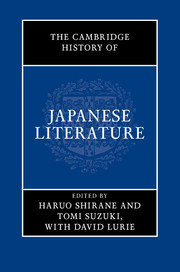Book contents
- The Cambridge History of Japanese Literature
- The Cambridge History of Japanese Literature
- Copyright page
- Contents
- Illustrations
- Contributors
- Book part
- A note on Romanization and conventions
- Glossary
- General introduction
- Part I The ancient period (beginnings to 794)
- Part II The Heian period (794–1185)
- Part III The medieval period (1185–1600)
- Part IV The Edo period (1600–1867)
- 38 Introduction to early modern Japanese literature
- 39 Publishing and the book in the seventeenth and eighteenth centuries
- 40 A forest of books: seventeenth-century Kamigata commercial prose
- 41 The rise of haikai: Matsuo Bashō, Yosa Buson, and Kobayashi Issa
- 42 Ihara Saikaku and Ejima Kiseki: the literature of urban townspeople
- 43 Representing theater: text and performance in kabuki and bunraku
- 44 Puppet theater: from early jōruri to the golden age
- 45 From the beginnings of kabuki to the playwrights Nanboku and Mokuami
- 46 Early to mid-Edo kanshi
- 47 Kanshibun in the late Edo period
- 48 Waka practice and poetics in the Edo period
- 49 Literary thought in Confucian ancient learning and Kokugaku
- 50 Bunjin (literati) and early yomihon: Nankaku, Nankai, Buson, Gennai, Teishō, Ayatari, and Akinari
- 51 Satiric poetry: Kyōshi, Kyōka, and Senryū
- 52 Picture books: from akahon to kibyōshi and gōkan
- 53 The birth of kokkeibon (comic novellas)
- 54 Ninjōbon and romances for women
- 55 Development of the late yomihon: Santō Kyōden and Kyokutei Bakin
- Part V The modern period (1868 to present)
- Bibliography of English secondary sources and translations
- Index
50 - Bunjin (literati) and early yomihon: Nankaku, Nankai, Buson, Gennai, Teishō, Ayatari, and Akinari
from Part IV - The Edo period (1600–1867)
Published online by Cambridge University Press: 05 January 2016
- The Cambridge History of Japanese Literature
- The Cambridge History of Japanese Literature
- Copyright page
- Contents
- Illustrations
- Contributors
- Book part
- A note on Romanization and conventions
- Glossary
- General introduction
- Part I The ancient period (beginnings to 794)
- Part II The Heian period (794–1185)
- Part III The medieval period (1185–1600)
- Part IV The Edo period (1600–1867)
- 38 Introduction to early modern Japanese literature
- 39 Publishing and the book in the seventeenth and eighteenth centuries
- 40 A forest of books: seventeenth-century Kamigata commercial prose
- 41 The rise of haikai: Matsuo Bashō, Yosa Buson, and Kobayashi Issa
- 42 Ihara Saikaku and Ejima Kiseki: the literature of urban townspeople
- 43 Representing theater: text and performance in kabuki and bunraku
- 44 Puppet theater: from early jōruri to the golden age
- 45 From the beginnings of kabuki to the playwrights Nanboku and Mokuami
- 46 Early to mid-Edo kanshi
- 47 Kanshibun in the late Edo period
- 48 Waka practice and poetics in the Edo period
- 49 Literary thought in Confucian ancient learning and Kokugaku
- 50 Bunjin (literati) and early yomihon: Nankaku, Nankai, Buson, Gennai, Teishō, Ayatari, and Akinari
- 51 Satiric poetry: Kyōshi, Kyōka, and Senryū
- 52 Picture books: from akahon to kibyōshi and gōkan
- 53 The birth of kokkeibon (comic novellas)
- 54 Ninjōbon and romances for women
- 55 Development of the late yomihon: Santō Kyōden and Kyokutei Bakin
- Part V The modern period (1868 to present)
- Bibliography of English secondary sources and translations
- Index
Summary
- Type
- Chapter
- Information
- The Cambridge History of Japanese Literature , pp. 488 - 502Publisher: Cambridge University PressPrint publication year: 2015



